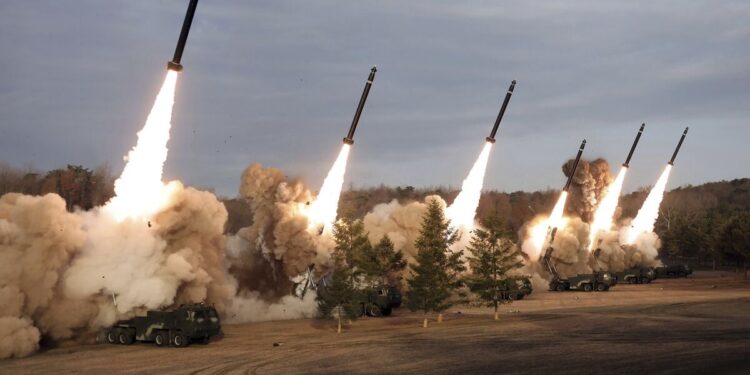North Korea has launched a volley of short-range ballistic missiles, marking another provocative act in defiance of international sanctions. South Korea’s military confirmed that ten missiles were fired from the Sunan area towards the east at approximately 6:14 AM on Thursday (21:14 GMT on Wednesday). The missiles traveled around 350 kilometers (217 miles) before landing in the sea.,The South Korean joint chiefs of staff described the launch as a “clear provocation” that poses a serious threat to the peace and stability of the Korean Peninsula. This act of aggression follows North Korea’s recent failed attempt to launch a second spy satellite into orbit, which ended disastrously when the rocket exploded mid-flight.
North Korean leader Kim Jong Un has prioritized the development of more advanced weaponry as part of his broader strategy to modernize the nation’s military capabilities. This includes deepening ties with Russia, which has led to accusations of North Korea supplying weapons for Russia’s use in Ukraine in exchange for technological assistance.
The missile launches have drawn swift condemnation from both South Korea and the United States. The U.S. Indo-Pacific Command urged North Korea to “refrain from further unlawful and destabilizing acts.” Washington’s response highlights the ongoing concern about North Korea’s military ambitions and its implications for regional security.
North Korea’s missile tests are banned under United Nations sanctions imposed over its nuclear program. Despite these restrictions, Pyongyang continues to conduct missile tests, escalating tensions and challenging the international community’s efforts to curb its nuclear ambitions.
An official from South Korea’s Permanent Mission to the United Nations indicated that the UN Security Council is expected to convene an open meeting on Friday in New York to discuss North Korea’s failed satellite launch. Such launches are considered violations of UN sanctions as they involve technology similar to that used in ballistic missiles.
UN Secretary-General Antonio Guterres also condemned the recent launch, urging North Korea to return to dialogue. This call for renewed talks underscores the international community’s desire for a diplomatic resolution to the ongoing tensions.
The missile launch has exacerbated concerns in Japan and South Korea, both of which are within range of North Korean missiles. Japanese and South Korean authorities have reiterated their commitment to strengthening their defense capabilities in response to North Korea’s actions.
The launch also comes amid broader geopolitical tensions, including North Korea’s growing ties with Russia and its alleged support for Russia’s military efforts in Ukraine. This relationship complicates the global security landscape and adds another layer of complexity to the already strained international relations involving North Korea.
Kim Jong Un’s focus on advancing North Korea’s military technology is part of a broader strategy to assert the country’s power and influence on the global stage. Despite facing severe economic challenges and international isolation, North Korea continues to invest heavily in its missile and nuclear programs.
The repeated missile tests serve multiple purposes: demonstrating military capability, deterring perceived external threats, and bolstering domestic support for the regime. However, these actions come at a significant cost, further isolating North Korea from the international community and exacerbating the hardships faced by its population.
The international community continues to advocate for diplomatic engagement as the primary means to address North Korea’s provocations. However, achieving meaningful dialogue has proven challenging, with North Korea often using its missile tests as leverage in negotiations.
The US and its allies have emphasized the importance of a coordinated international response to North Korea’s actions. This includes maintaining and enforcing sanctions while keeping the door open for negotiations aimed at denuclearization and regional stability.
North Korea’s recent missile launches highlight the ongoing volatility on the Korean Peninsula and the broader regional security challenges. The international community’s response underscores the urgency of addressing North Korea’s provocations through a combination of diplomatic pressure and engagement. As the UN Security Council prepares to discuss the situation, the world watches closely, hoping for a path forward that ensures peace and stability in the region.
















